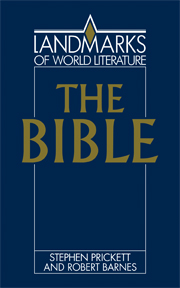2 - The contents of the Bible
Published online by Cambridge University Press: 19 January 2010
Summary
This chapter summarizes the contents of the main books or sections of the Bible. For the Hebrew Bible the traditional Jewish order of books is followed, with some minor changes in the ‘Writings’. For the New Testament the traditional order is followed, except that Mark, being commonly regarded as the earliest Gospel, is placed first. Discussions of sources and other critical matters are avoided, except where these are essential for understanding the present contents of the books. However, some general indication is given of ancient Near Eastern or Greek backgrounds, where these throw light on what sort of works the books are. Comments are also offered on books or sections which point backwards or forwards, in particularly important ways, to other parts of the Bible. The New Testament section begins with a short discussion of ‘The Gospels and the historical Jesus’.
The Hebrew Bible
Genesis Genesis consists of two obviously different parts: the Primeval History in 1–11, and the History of the Patriarchs in 12–50. The Primeval History aims to give an account of the creation of the world and of human beings; of humans' frustrated desire to be like God; of the development of human culture from a hunting to an agricultural to a technological level; of the limitations on the span of life allowed to humans; of God's attempt to wipe out human beings by a flood while saving one man, Noah, and his family with the animals; of the racial groupings and diverse languages of mankind; and of the supposed generations of the first men down to the Hebrew patriarchs.
- Type
- Chapter
- Information
- The Bible , pp. 18 - 42Publisher: Cambridge University PressPrint publication year: 1991

